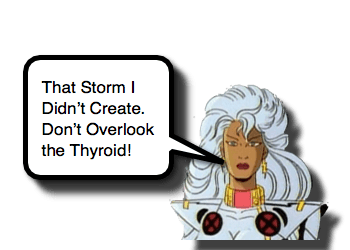Thyroid Storm

Thyroid Storm: Basics
- Thyroid hormone influences almost every tissue. [Bahn, 2011]
- Cellular actions of thyroid hormone are mediated by T3, the active form of the hormone.
- Thyrotoxicosis / Hyperthyroidism
- Thyrotoxicosis – clinical state resulting from high thyroid hormone action due to inappropriately high tissue hormone level. [Bahn, 2011]
- Hyperthyroidism – a form of thyrotoxicosis due to high synthesis and secretion of thyroid hormone(s) by the thyroid gland. [Bahn, 2011]
- Hyperthyroidism prevalence in USA – ~1% [Bahn, 2011]
- Median age of onset of hyperthyroidism = ~11 years
- CNS symptoms often prevalent in children with hyperthyroidism (adults often with more Cardiac symptoms).
- Tremor, hyperreflexia
- Anxiety and fragile emotional states
- Frequent bowel movements
- Thyroid Storm is a severe form of thyrotoxicosis.
- Life-threatening crisis that requires rapid assessment and management.
- Can lead to overt hemodynamic instability.
- Since it’s symptoms can be similar to other critical illnesses (ex, sepsis, toxic ingestion), it take vigilance and active consideration to diagnosis it promptly.
- ~1-2% of patients with hyperthyroidism will experience a thyroid storm event.
Thyroid Storm: Presentation
- Individual symptoms are not often specific.
- Fever, diaphoresis, weakness
- Nausea, vomiting, abdominal pain
- Tachycardia, hypertension
- Extreme anxiety, confusion, altered mental status, seizures, coma
- High-out congestive heart failure, arrhythmias
- Hypotension may develop late
- Characterized by MULTIsystem involvement! (remember the thyroid hormone influences nearly every organ system)
- High index of suspicion is needed – keep it high on Ddx of patient with thyrotoxicosis and decompensation. [Bahn, 2011, Ureta-Raroque, 1997]
- There is a Point Scale for the Diagnosis – see [Bahn, 2011]
Thyroid Storm: Precipitants
- Often the precipitating cause of the Thyroid Storm can, itself, produce symptoms similar to the Thyroid Storm, making it challenging to consider.
- Infection, Trauma and Surgery are commonly associated with Thyroid Storm.
- Other physical or emotional stressors can lead to Thyroid Storm.
- Anesthesia
- Uncontrolled diabetes
- Pre-eclampsia/eclampsia
- Medical reaction / side-effect (ex, taking over the counter cold-preparation medications) [Ureta-Raroque, 1997]
- Abrupt cessation of antithyroid Rxs
- Exogenous thyroid hormone ingestion [Majlesi, 2010]
- Rarely following radioactive iodine therapy [Rohrs, 2014; Bahn, 2011]
- Exposure to iodine-containing contrast (decompensation after CT??)
Thyroid Storm: Therapy
- Multimodality approach is recommended. [Bahn, 2011]
- Beta-Adrenergic Blockade
- Propanolol – thought to also block peripheral conversion of T4 to T3.
- Esmolol is an alternative
- Antithyroid Drug Therapy
- Proplthiouracil (PTU)
- Blocks new hormone synthesis AND peripheral conversion of T4 to T3
- In patients with Graves Disease, use has been associated with Hepatotoxicity and, therefore, not recommended. [Glinoer, 2012]
- Methimazole – Blocks new hormone synthesis. Do NOT use in pregnancy.
- Proplthiouracil (PTU)
- Inorganic Iodine
- Potassium iodine (ex, SSKI) – Blocks synthesis and release of hormone.
- May use Lithium if patient has allergy to iodine.
- Start 1 hour AFTER giving Antithyroid Rx [Bahn, 2011]
- Corticosteroids
- Stress dose Hydrocortisone or Dexamethasone.
- May block peripheral conversion of T4 to T3
- Used to empirically treat possible adrenal suppression.
- Supportive Measures
- Aggressive Cooling Measures
- Acetaminophen
- Cooling blankets and ice packs!
- Volume Resuscitation
- Respiratory Support
- Treat heart failure and/or arrhythmia
- Aggressive Cooling Measures
- Treat Precipitating Events
- Don’t overlook the issue that caused the decompensation.
- Consider empiric antibiotics if unclear inciting event.
Moral of the Morsel
- While the critically ill child will appropriately generate concern for the usual suspects (ex, Sepsis, Hypovolemia, Mechanical Obstruction, Cardiogenic, Adrenal Crisis, Intussusception/Bowel injury), don’t overlook the potential for other offenders!
- History of conditions related to thyrotoxicosis should raise your concern!
- Feel the anterior neck too… maybe you’ll just find the answer when you palpate an enlarge thyroid gland. (see case described by Ureta-Raroque, 1997)
- As always… be Vigilant!
References
Rohrs HJ 3rd1, Silverstein JH1, Weinstein DA1, Amdur RJ2, Haller MJ1. Thyroid storm following radioactive iodine (RAI) therapy for pediatric graves disease. Am J Case Rep. 2014 May 14;15:212-5. PMID: 24847412. [PubMed] [Read by QxMD]
Glinoer D1, Cooper DS. The propylthiouracil dilemma. Curr Opin Endocrinol Diabetes Obes. 2012 Oct;19(5):402-7. PMID: 22820213. [PubMed] [Read by QxMD]
Bahn Chair RS1, Burch HB, Cooper DS, Garber JR, Greenlee MC, Klein I, Laurberg P, McDougall IR, Montori VM, Rivkees SA, Ross DS, Sosa JA, Stan MN; American Thyroid Association; American Association of Clinical Endocrinologists. Hyperthyroidism and other causes of thyrotoxicosis: management guidelines of the American Thyroid Association and American Association of Clinical Endocrinologists. Thyroid. 2011 Jun;21(6):593-646. PMID: 21510801. [PubMed] [Read by QxMD]
Majlesi N1, Greller HA, McGuigan MA, Caraccio T, Su MK, Chan GM. Thyroid storm after pediatric levothyroxine ingestion. Pediatrics. 2010 Aug;126(2):e470-3. PMID: 20643722. [PubMed] [Read by QxMD]
Ureta-Raroque SS1, Abramo TJ. Adolescent female patient with shock unresponsive to usual resuscitative therapy. Pediatr Emerg Care. 1997 Aug;13(4):274-6. PMID: 9291518. [PubMed] [Read by QxMD]


[…] of that little gland in the neck. We have previously discussed when that gland goes bad and causes Hyperthyroidism and Thyroid Storm. Now, let’s look at Hypothyroidism and Myxedema […]
Doctor Fox it is possible to update the app with the latest recommendations
Thanks
This is on the “to-do” list… I just need more time in the day.
Thank you for reminding me to keep it on the list.
🙂
-sean
One “pearl” is to avoid CT with iodinated contrast until an hour after PTU is given.
Patients get significantly worse with the iodine load.
Thank you Dr. Colucciello!
You are 100% correct. The iodine load can be the precipitating factor of Thyroid Storm! This is definitely something to keep in mind if a patient with thyrotoxicosis returns from a Contrasted CT and suddenly is worsening!
Thank you,
sean